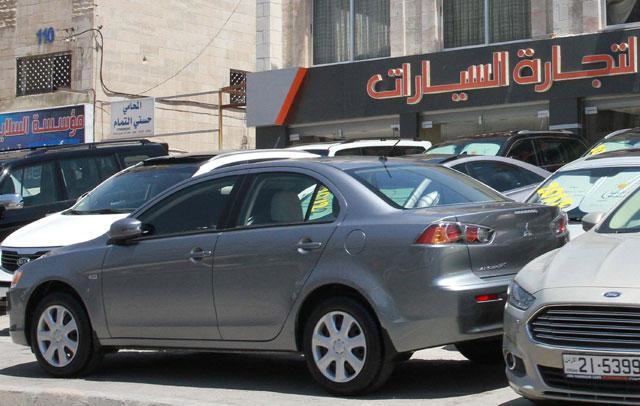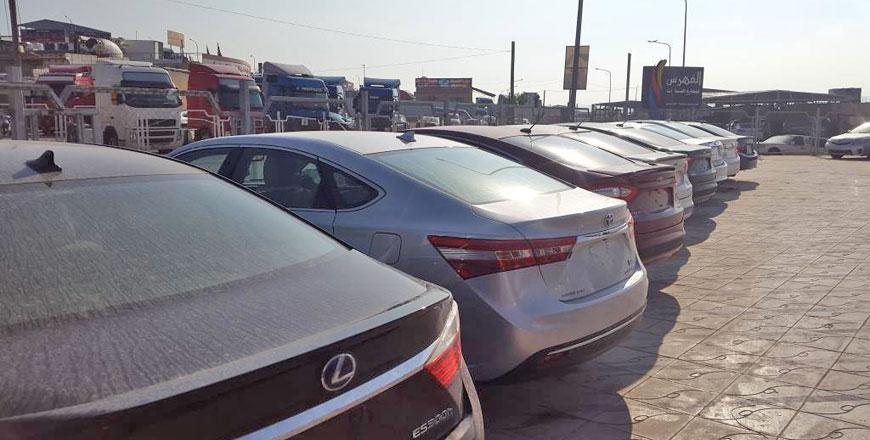You are here
Dealers expect prices of used cars to go up following tax hikes
By Mohammad Ghazal - Jun 30,2016 - Last updated at Jun 30,2016

A second-hand car with a 'for sale' sign is seen in Amman recently (Photo by Hassan Tamimi)
AMMAN — Prices of used cars are expected to go up by JD600 to JD3,000 in the domestic market due to recent tax hikes by the government, according to automobile dealers.
In phone interviews with The Jordan Times on Tuesday, traders described the June 20 decisions to reduce tax exemptions on imported used cars and increase ownership transfer fees of private vehicles as “disastrous” for the sector, as it will slow down demand for second-hand vehicles, adding that dealers may stop selling cars to protest the decision.
“It is unreasonable and unacceptable,” said Nabeel Rumman, president of the Jordan Free Zone Investor Commission (JFZIC), which is the largest entity in Jordan representing importers of used cars.
The recent decision to lower the rate of tax exemptions on used cars was part of a set of fiscal measures the government took to raise public revenues.
Rumman said the decisions regarding the automobile trade — which went into effect on Monday — would increase prices by 8 to 17 per cent, depending on the model and engine size.
He added that traders would resist the hike in fees, which he sees adding pressure to a sector that has already been hit hard by the closure of borders with Iraq and the loss of key markets in Libya, Yemen and Syria.
“Investors agreed to stop selling and buying cars to place pressure on the government to reverse its decision…The government thinks it will create more revenue, but this will backfire as there is already a recession in the sector,” Rumman said.
The Treasury receives around JD500 million a year from the automobile sector, but this number is likely to fall, not only because of the increase in customs duties, but also due to the recent “reckless” move by the government to increase the ownership transfer fees of cars, the JFZIC president said.
“This strange decision comes at a time when investors at the zone suffer very tough times because of the closure of many regional markets and difficult financial conditions for citizens, many of whom cannot afford any increase,” Rumman added.
In a bid to renew the vehicles on the Kingdom’s roads and to address the ballooning gasoline bill, the Cabinet in 2012 placed a five-year age limit on all cars entering the local market.
Investors used to export 11,000 cars to Iraq every month before the border closed, Rumman noted.
Faheem Maadi, a car dealer at the zone, slammed the government’s decision.
“The prices of cars made in 2011 will witness the highest increase. These cars are usually cheaper than 2012 models and so many Jordanians prefer them,” he told The Jordan Times.
“The decision will cause severe losses to traders who have large stockpiles of cars and will increase the burden on buyers,” the car dealer said.
“Dealers are already suffering losses, and business is very slow. It seems that the government took the decision without thinking. The government thinks it will make more money, but that will not be the case. When our business is down, their revenues are too,” Maadi added.
An employee at another car dealer store at the zone agreed.
“Our business is not as good as before. There are not many buyers coming to the zone and this decision will harm us,” the employee, who asked not to be named, told The Jordan Times.
“This move will encourage buyers to choose brand new cars, but what about the thousands of used cars at the zone?” the employee asked.
Related Articles
AMMAN — Traders at the Jordan Free Zone on Monday threatened to set fire to cars at their dealerships in the zone in protest over recent tax
AMMAN — The government will not reverse tax hikes on used cars, but will consider alternative proposals by the Jordan Free Zone Investors Co
AMMAN — Traders at the Jordan Free Zone said on Sunday they will continue their strike until the government responds to their demands to rev


















